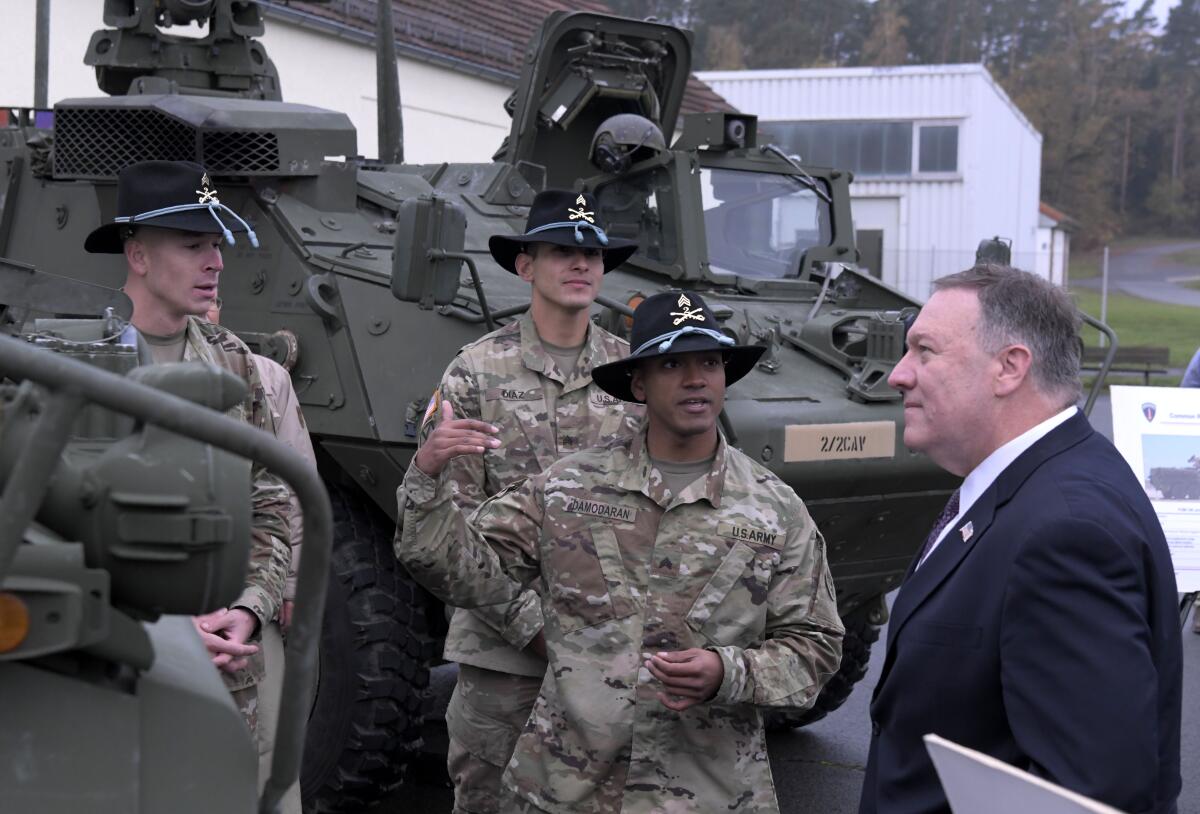Would impeachment inquiry hurt a Pompeo run for Senate?

- Share via
WASHINGTON — When he toured German sites earlier this month that symbolize the fall of the Berlin Wall, Secretary of State Michael R. Pompeo said he was taking a trip down memory lane.
With a State Department videographer trailing, Pompeo told American soldiers and German anti-Communist resistance fighters about his days as a young U.S. Army captain patrolling the area in 1989.
Despite his fond memories, Pompeo chose not to stay in Berlin for the big event: the 30th anniversary of the fall of the wall. He headed back to Washington the day before the ceremonies, but with plenty of patriotic footage of himself in action.
There’s another locale to which Pompeo has traveled a lot in recent months, and where that footage from Germany may soon be seen in television ads — Kansas, where Republican officials are eager to have him run for the Senate.
Pompeo has made at least four trips to the Midwest this year and given dozens of interviews to media in his home state. The extent of that domestic travel is unusual for America’s top diplomat, and many of his appearances, such as a speech to the American Assn. of Christian Counselors, resemble campaign stops more than the traditional speaking engagements of a secretary of State.
Pompeo repeatedly has denied he is planning a candidacy, saying he wants to continue as secretary of State “as long as President Trump wants me on the team.”
Other Republicans are openly lobbying for him to get into the race.
On Friday, Trump for the first time publicly raised the possibility. “If he thought there was a chance of losing that seat, I think he would” get in the race, Trump told “Fox & Friends.”
There is a chance of Republicans losing the seat from which incumbent Sen. Pat Roberts plans to retire. That’s why Senate Majority Leader Mitch McConnell (R-Ky.) and other national GOP leaders want Pompeo to run.
Even though Kansas is a deeply conservative state — it last elected a Democratic senator in 1930, and Trump won the state in 2016 by 20 points — Republicans worry that Democrats would have a shot if the GOP nominee is Kris Kobach, the controversial former Kansas secretary of state.
Kobach, a polarizing anti-immigrant conservative who is already running for the nomination, lost a statewide bid in 2018 when he ran for governor, giving Democrats the Kansas statehouse.
If Kobach were the Senate nominee, GOP leaders fear, Democrats would get one more shot at picking up the three or four seats they need to win a Senate majority. There are already four other competitive states — Maine, Arizona, Colorado and North Carolina — but sweeping them is a long shot. Democrats would welcome a chance to make another state competitive.
“Anybody who cares about Republicans winning the Senate election in Kansas or who cares about Republicans maintaining a majority in the Senate has to start from the proven fact that Kris Kobach is a loser,” said David Kensinger, a Kansas political consultant. “People who care about winning want to see Mike Pompeo run.”
In early November, at a Senate fundraising event at the Trump International Hotel in Washington, a top official of the National Republican Senatorial Committee instructed donors to call Pompeo and urge him to run, according to people familiar with the event.
But Pompeo’s calculations have been complicated by a new development: He has been deeply implicated in the actions involving Ukraine that are likely to lead to Trump’s impeachment by the House.
According to testimony at House hearings from the U.S. ambassador to the European Union, Gordon Sondland, a major Trump donor, and others, Pompeo was “in the loop” in efforts to pressure the Ukrainian government to do political favors for Trump.
The testimony portrayed Pompeo as willing to sacrifice diplomacy to Trump’s political goals and to countenance the outsourcing of foreign policy to figures like Rudolph W. Giuliani, the president’s lawyer.
“He would probably win the general election, but with a lot more tarnish on his armor than he would have had six or seven months ago,” said Burdett Loomis, an emeritus professor of political science at the University of Kansas. “He’s moved from being a shoo-in to being a more-conventional favorite.”
Pompeo has also come under enormous criticism in foreign policy circles for his refusal to publicly defend the diplomats who have testified and have been disparaged by Trump and his allies.
The case that most outraged diplomats, and prompted the resignation of one of Pompeo’s most senior advisors, involved the former U.S. ambassador in Kyiv, Marie Yovanovitch, who was unceremoniously recalled in May at the urging of Giuliani, armed with false claims about her loyalty to Trump.
Pompeo never offered a statement of support for the highly regarded Yovanovitch, despite the urging of other State Department officials. He has been unflappably dismissive of the entire impeachment process, referring to it at one point as a “Washington gotcha game.”
“Pompeo has failed to protect his people, failed to protect the president from bad information [about Ukraine] and failed to stand up for his duties as secretary of State,” said Daniel Fried, a retired American diplomat who handled European affairs and other matters for four decades.
The impeachment disclosures have not diminished the confidence GOP leaders have in Pompeo as a candidate. Still, a homecoming for Pompeo would not be without baggage.
Despite his courting of local media in Kansas, Pompeo has faced tough questioning.
In a visit to Wichita in October, reporters pressed him about the impeachment inquiry, its impact on him and his credibility, and the role of Giuliani.
Pompeo grew testy and dismissive, telling the reporters repeatedly that they were “fixated” and “inordinately focused” on matters he contended aren’t important to ordinary Americans.
One reporter asked, given the turmoil in the world, whether visiting Kansas was really the best use of his time. Another asked whether the Trump administration’s decision to withdraw from northern Syria, abandoning Kurdish allies, might make the U.S. appear to be an unreliable partner.
“The whole predicate of your question is insane,” Pompeo responded.
Critics say Pompeo’s comments, including his frequent praise for Trump’s policies as an improvement over those of the Obama administration, are unusually partisan for a secretary of State, a role that in theory stays above the political fray. That combined with what they see as a downgrading of State Department diplomacy has worsened already low morale and a continued exodus of senior and mid-level foreign service officers.
“Pompeo is trapped in an environment where he has successfully negotiated a way for three years to stay on top with this idiosyncratic fellow, and now it’s all at risk” because of the impeachment proceedings, said a former senior State Department official who remains close to Pompeo who asked not to be identified to talk about his old boss.
“If you are Mike Pompeo, the dilemma is do you continue as secretary in a highly partisan environment dominated by impeachment and campaign, or it’s how do you extricate yourself while maintaining the good graces of the president.”
Pompeo could wait until June to file, but consultants advise against waiting that late because of lost campaign time and fundraising opportunities. On the other hand, an early declaration, in the midst of a Senate impeachment trial, could also be tricky.
As he remains coy about the Senate race, there is one other job that he has been more direct about: the presidency.
Asked if he might one day run for president, Pompeo said: “Were it the case there came a time in my life ... that it was something that I could do, where I could make a difference, where I could have a real impact on the lives of the people of the United States, I’d consider it.”
More to Read
Get the L.A. Times Politics newsletter
Deeply reported insights into legislation, politics and policy from Sacramento, Washington and beyond. In your inbox three times per week.
You may occasionally receive promotional content from the Los Angeles Times.












